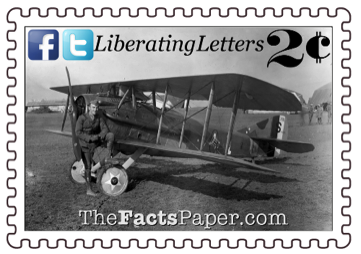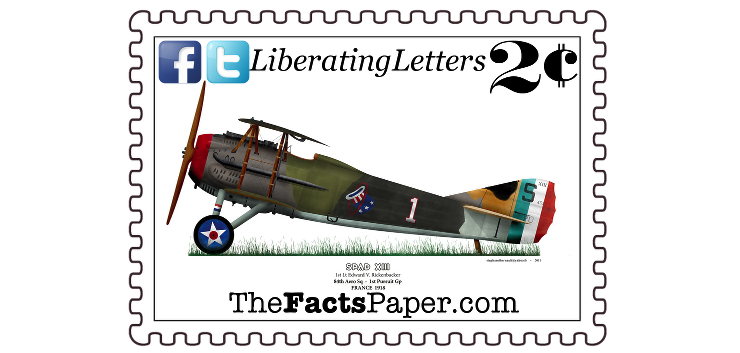October 8, 2016
Dear Liberty,
Heroes are created, not born. They are forged by determination, they take advantage of any opportunity, and they take charge when all the circumstances are against them. Edward was the perfect example of just such a hero. He was born on October 8, 1890, in Columbus, Ohio, and quit school to go to work 12 years later when his father died. With only a sixth grade education, the third of eight children took on the responsibility of supporting his family. Edward eventually began work for General Motors as a salesman, but his first claim to fame came from racing the very cars he sold. “Fast Eddie” gained national attention as a skilled driver, but his fame took second place to his patriotism. When America entered World War I, Edward was among to first to enlist.
Having the need for speed and a certain amount of fame, Edward requested permission to form a fighter squadron composed of like-minded race car drivers. Despite his passion, the Army felt his talents would be more useful elsewhere. As a Sergeant First Class, he was assigned the position of chauffeur for Major General John J. Pershing. (see The Forgotten General and A Tale Of Two Soldiers)
Pershing was the Commander of the American Expeditionary Force at the outbreak of World War I. To be his chauffeur was among the highest achievements an enlisted man could hold. But Edward set his sights much higher, to soaring above the battlefield providing air cover for the ground troops below. When Colonel Billy Mitchell of the US Army Air Service requested Edward’s knowledge of automobiles to help in fixing his car, Eddie took advantage of the opportunity. Not only did he fix the car, he told Mitchell of his desire to fly. Colonel Mitchell respected his determination and arranged for him to attend flight school even though, at age 27, he was considered too old for the program. Upon completion, Eddie joined the 94th Aero Squadron.
Edward flew his first mission on April 6th, 1918, with his first air victory coming weeks later on April 29th. Within a month, on May 28th, Edward became the first American Fighter Ace when he downed his fifth enemy airplane. (see Big Red Won) When the commander of the 94th was shot down and captured, Edward was quickly promoted to captain and became the unit commander on September 24th. That day, he wrote in his diary, "Just been promoted to command of 94th Squadron. I shall never ask any pilot to go on a mission that I won't go on. I must work now harder than I did before."
The following day, Edward was leading an early morning patrol when he spotted seven enemy aircraft. He immediately led the squad in engaging the planes in a dogfight. During the event, Edward downed two planes earning him his eighth Distinguished Service Cross.
All told, Edward won 26 air battles over the skies of Europe. Eighteen of those kills were obtained in the 48 days he was commander of the squadron. Armistice Day (see Veterans' Day) occurred twelve days later, officially ending the war. For his heroic fighting, Edward not only received eight Distinguished Service Crosses, he was also awarded the French Croix de Guerre and Legion of Honor. Recognizing the significance of his efforts, 12 years later, President Hebert Hoover elevated one of his acts of valor to the Medal of Honor, the highest honor given in the military.
His medals were given to Edward under his pseudonym. When war began with Germany, Edward Reichenbacher believed his German name would attract an anti-German sentiment. Because of this, he tweaked the spelling of his name to Rickenbacker - Eddie Rickenbacker.
After retuning home in 1919, Rickenbacker began settling into a normal life. He married and began Rickenbacker Motors. His start-up company was quickly squashed by the larger manufactures. Despite not succeeding as a company, several advances they made, such as four-wheel braking, still exist today. Disregarding the setback, Rickenbacker returned to his first love and bought the Indianapolis Motor Speedway in 1927, which he owned until 1945. During his ownership, he made significant improvements to the track and racing experience.
Though he still loved racing, his heart belonged to aviation. In 1934, General Motors asked their former employee to improve their Eastern Air Transport Division. Rickenbacker turned the company around in one year, giving it the first profit ever obtained from any airline. He increased that profit each year until the government forced GM to sell the company or withdrawal from airline manufacturing. They were set to sell for $3 million when Rickenbacker approached them. He requested the chance to save the company for those who built it. They agreed to sell it to him for $3.5 million but he only had 60 days to raise the money. The night before his deadline, he received the remainder of the asking price. Rickenbacker bought Eastern Airlines on March 2, 1938.
On a foggy February night in 1941, Rickenbacker was flying to Atlanta as a passenger on one of his planes when the plane crashed on a mountain. Rickenbacker sustained a broken leg and several broken ribs, a paralyzed hand, a shattered pelvic bone and a torn eyelid, which expelled his left eye. To top that off, debris had pinned Rickenbacker next to a steward’s dead body. Despite the obstacles, Rickenbacker quickly took charge of the situation. He recognized the severity of the situation, but reassured the survivors and sent the healthiest to go for help. He forced himself to remain conscious until he arrived at the hospital nine hours later.
Fully recovered, Rickenbacker was ready to offer his services again when World War II broke out. Secretary of War Henry Stimson requested he visit and assess European Allied bases. Upon completion of this assignment, Stimson sent Rickenbacker to the Pacific on a similar mission. Stimson also gave Rickenbacker a personal task. MacArthur had publicly criticized the Roosevelt Administration. Stimson was secretly reprimanding MacArthur in a message Rickenbacker was to personally deliver.
Rickenbacker was on his way from Hawaii to Canton Island in October 1942 with seven other men when their plane went drastically off course. While flying over the Central Pacific Ocean, the B-17 Flying Fortress made a crash landing. With the plane quickly sinking, the eight injured men jumped aboard life rafts. “Captain Eddie”, the only civilian and the oldest man in the group, once again took the leadership role. With a food supply of only four oranges, Rickenbacker was able to ration them out for six days.
While millions at home prayed for the lost men, the survivors held devotionals of their own. They regenerated their spirits with prayers and singing hymns. On the eighth day, they were out of food, water, and hope. Survival seemed bleak. As the men floated on the raft that afternoon, Rickenbacker reclined back, placing his cap on his face in hopes of getting some rest. After some time he felt a seagull land on his cap. Lying still so as not to scare it away, Rickenbacker carefully calculated his next move. He grabbed the bird and rung its neck. The starving men were each given a share of the meat, while the intestines were used as bait to catch fish. Remains of the fish they caught were then again used to catch more fish. The heavens occasionally opened up and sent them fresh water, which they collected and also rationed. The cycle continued until the group’s twenty-four day ordeal was ended on November 13th by a passing US Navy OS2U Kingfisher.
During their time at sea, Rickenbacker saved a man who tried to drown himself, claiming his death would help save the others. One man, Alexander Kaczmarczyk of the USAAF, was recovering from a long illness. He was the only one not to survive the horrific conditions of the event and was buried at sea.
Despite dehydration, and near-starvation, along with a severe sunburn, Rickenbacker eventually completed his mission in the Pacific Theater before returning home.
For all of Rickenbacker’s contributions during the 2nd World War, he received the Medal of Merit.
After the war, Rickenbacker returned to his position of CEO of Eastern Airlines. The company remained profitable until 1960 when the airline business began to slide backwards. Subsidies had been granted to competing airlines, which resulted in harm to Eastern. Also, Rickenbacker did not like to purchase equipment before properly testing it in the field. Having survived war and two airline crashes, he recognized the importance of reliable aircraft. He was reluctant to turn to unproven jet planes and risk the lives of passengers. However, this decision affected Eastern’s status in the airline business. He was forced out of his position on October 1, 1959, but remained Chairman of the Board until December 31, 1963. In his resignation letter, he declared, “I am going to expand my crusade to save the American way of life for future generations, as I want our children, our grandchildren, and those who follow them to enjoy the American opportunities which have been mine for 73 years."
During his time at Eastern, Rickenbacker completely revolutionized the commercial airline business. Early on he negotiated a contract with the government for airmail routes. This one move alone took a small carrier and made it a national entity by the time Rickenbacker left.
Rickenbacker was a stanch conservative and lent his voice to the cause in his retirement. During World War II, Rickenbacker had vehemently spoken out against Roosevelt’s New Deal, seeing it as little more than socialism. (see Unlearned Lessons Of The Bonus March and Is Justice Blind?) He realized that heroes are forged by determination, not social programs. Heroes are built on seizing opportunity, not on handouts. Heroes are built by confronting circumstances, not giving into them.
In the 1960s he openly and loudly sounded the alarm of the destruction these government programs were doing to the country and its people. Even in his early days at Eastern he denounced government subsidies, claiming companies could be profitable without them. He gave speeches praising America’s greatest gift was the “freedom to go broke.” He believed that “a chance’” was all one needed to achieve in America. He urged America withdrawal from the United Nations and that the 16th Amendment be repealed. (see One World Disorder)
Rickenbacker suffered a stroke at his home in Miami, Florida, in October of 1972. In July of 1973, he and his wife traveled to Zurich, Switzerland, where he became ill a few days after arrival. He died of a heart condition on July 27th and was flown to his hometown of Columbus for burial.
Liberty, in all sense of the word, Edward Rickenbacker was a hero. His acts of bravery are astounding. But he is not a hero because he is any more special than anyone else. He is a hero because when situations arose that needed attention, Rickenbacker acted. Rickenbacker became a hero the moment he left school to work to support his family at 12-years-old.
Modern American society has taught our children that we are all victims of something. Rickenbacker is a hero because he never allowed himself to be a victim. He turned every situation into a benefit for himself and those around him. This, Liberty, is what heroes are made of.
That’s my 2 cents.
Love,
Mom
A HERO'S HERO




